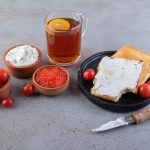
Dealing with eczema? Nutritionist Olga Hamilton suggests certain foods can help reduce the inflammation that causes dry, itchy, and flaky skin. In the UK, eczema affects one in five children and one in 12 adults. While diet may not directly cause eczema, certain foods can trigger flare-ups.
Studies have shown that dietary factors can worsen eczema, with reactions occurring soon after eating. Olga shares five ways to ease eczema through your diet:
1. Probiotics: These are live microorganisms that support your immune system and gut health, reducing inflammation, a key contributor to eczema. Common probiotic strains are Lactobacillus and Bifidobacterium, typically found in foods like yogurt, kefir, raw cheese, fermented soy products (natto, tempeh, and miso), kombucha, and fermented vegetables (sauerkraut, kimchi). Try incorporating small amounts daily, like a tablespoon of sauerkraut in your salad or 200 grams of yogurt as a snack.
2. Prebiotics: These are non-digestible carbohydrates that feed probiotic bacteria, helping them thrive. They can be found in foods like beans, legumes, Jerusalem artichokes, leeks, shallots, chicory, asparagus, mushrooms, garlic, and onions. Aim for three portions of these vegetables per day to boost gut health and reduce inflammation.
3. Cruciferous Vegetables: Poor liver function can drive eczema. The liver filters toxins from the blood, but when overloaded, these toxins can cause inflammation and eczema. Cruciferous vegetables (like cabbage, kale, turnip, broccoli, cauliflower, and Brussels sprouts) support liver detoxification with their anti-inflammatory properties. Aim for two portions daily to maintain liver health and reduce eczema symptoms.
4. Turmeric: This spice, commonly used in Asian cuisine, has strong anti-inflammatory and antioxidant properties due to its active ingredient, curcumin. It helps strengthen the immune system and reduce eczema symptoms. Incorporate turmeric into your diet through dishes like curries to benefit from its medicinal properties.
5. Vitamin D: This vitamin is crucial for immune health and reducing inflammation. It’s produced in the skin through sun exposure and found in foods like wild oily fish, vitamin D-enriched mushrooms, and grass-fed butter. People with eczema often have lower vitamin D levels, so it’s important to ensure adequate intake to manage inflammation and support the immune system.
By incorporating these dietary changes, you can help manage eczema symptoms and improve your overall well-being.

